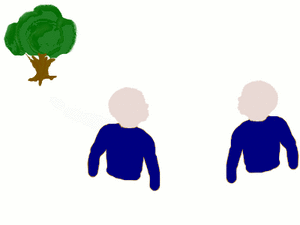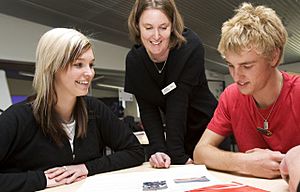Social skills facts for kids
A social skill is how well you interact and communicate with other people. These skills help you understand and follow social rules. They also help you build and change relationships. You use social skills when you talk (verbal) and when you use body language (nonverbal). Learning these skills is called socialization. If someone doesn't have strong social skills, they might feel socially awkward.
Interpersonal skills are actions you use to get along well with others. They involve things like being able to convince someone, listening carefully, and working with others. Social psychology is a field that studies how people learn these skills. It looks at how our attitudes, thoughts, and behaviors change because of society.
Contents
Why Social Skills Are Important
Social skills are like tools that help you connect with people. They let you communicate, learn new things, and ask for help when you need it. They also help you get along with others, make friends, and build healthy relationships. Good social skills help you interact smoothly with society.
These skills also build important character traits. These include being trustworthy, respectful, responsible, fair, caring, and a good citizen. These traits help you develop your own inner guide. This guide helps you make good choices in how you think and act. This leads to being socially competent.
The Employment and Training Administration has listed some key social skills:
- Coordination – This means adjusting what you do based on what others are doing.
- Mentoring – This is teaching or helping someone else learn something. For example, being a study partner.
- Negotiation – This is a discussion where people try to reach an agreement.
- Persuasion – This is the act of convincing someone to do or believe something.
- Service orientation – This means actively looking for ways to help and grow with people.
- Social perceptiveness – This is being aware of how others are reacting. It also means being able to respond in a way that shows you understand them.
Why Some People Struggle with Social Skills
Sometimes, people have trouble with social skills. This can happen if they don't learn them well. It can also happen if they don't get enough chances to practice them.
ADHD and Hyperkinetic Disorder
People with ADHD (Attention-Deficit/Hyperactivity Disorder) often find social interactions difficult. About half of kids and teens with ADHD might have trouble making friends. This is compared to only 10-15% of kids without ADHD.
Teens with ADHD might find it harder to make close friends or have romantic relationships. Their peers sometimes see them as immature. However, they might connect well with others who also have ADHD. Social skills training, behavior help, and medication can be useful. It's helpful for young people with ADHD to make friends who are positive influences. This can help prevent future problems.
Autistic Spectrum Disorders
Individuals with autistic spectrum disorders, like autism and Asperger syndrome, often have challenges with social skills. They might find it hard to understand social cues. Experts suggest using special methods to help autistic children learn social skills. These methods focus on changing behaviors to help them in social situations.
Anxiety and Depression
People who don't get many chances to socialize often struggle with social skills. This can create a difficult cycle for those with anxiety or depression. If someone feels very anxious about what others think, they might avoid social interactions. This fear of being judged or rejected can make them shut down.
People with high social anxiety might find it hard to communicate. They may also struggle to show the right social cues. Using social media can also sometimes lead to anxiety and depression. Some studies show that spending too much time online can be linked to depression in high school students. However, other studies show that the internet can also have positive effects.
Depression can also make people avoid social activities. This can make their social skills weaker. It can also make socializing seem less appealing.
Learning Social Skills
Behavioral Therapy
Behavioral therapy is a way to learn and improve social skills. It sees social skills as behaviors that can be learned. These behaviors help you get positive reactions from others. This type of therapy often uses methods like practicing new behaviors. It also uses watching others who show good social skills.
Behavioral skills training is used to help many different people. This includes those with emotional challenges, depression, and developmental disabilities. The goal is often to teach "cusp skills." These are important skills that open up many new opportunities for people. This approach helps people practice how to handle social problems in a safe place. It also teaches them how to get more positive results by using the right skills.
See also
 In Spanish: Habilidades sociales para niños
In Spanish: Habilidades sociales para niños
- Antisocial personality disorder
- Basic interpersonal communicative skills
- Circle of Friends (disabled care)
- Dark triad
- DISCO – European Dictionary of Skills and Competences
- Emotional intelligence
- Life skills
- Metacommunicative competence
- People skills
- Social behavior
- Social cognition
- Social dynamics
- Social intelligence
- Social reality
- Social thinking
- Soft skills
 | DeHart Hubbard |
 | Wilma Rudolph |
 | Jesse Owens |
 | Jackie Joyner-Kersee |
 | Major Taylor |



